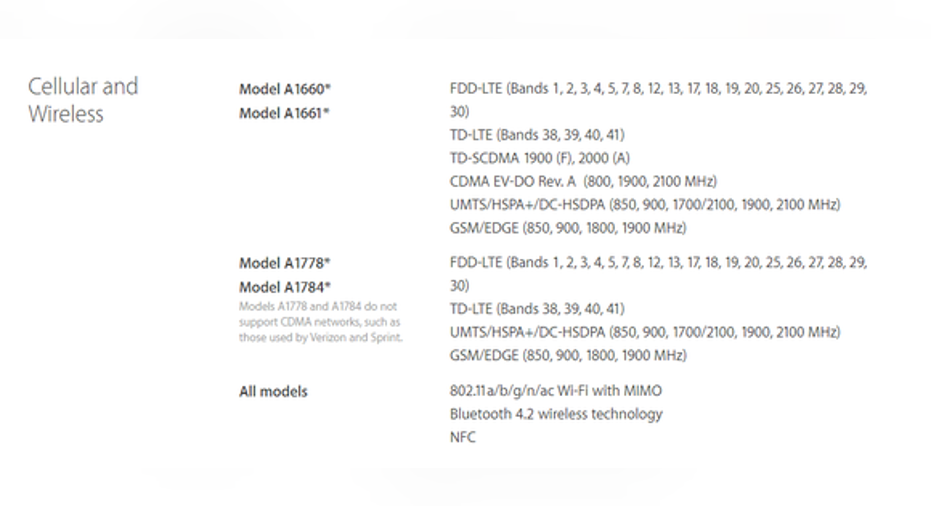Apple Inc. iPhone 7 Specs Suggest Intel Corp. Modem Win

Image source: Apple.
It had been rumored for quite some time that Apple (NASDAQ: AAPL) had decided to use cellular modem chips from microprocessor giant Intel (NASDAQ: INTC) in its upcoming iPhone 7 series of smartphones. After Apple's launch presentation and subsequent publication of the specifications of the new phones on its website, there is no longer any doubt that Intel has won a material portion of the iPhone order volumes.
The hard evidence
On the Apple website, the company provides the key technical specifications for both the iPhone 7 and iPhone 7 Plus. These specifications include lists of the various cellular standards and wireless bands that the phone supports.
Here's the wireless-band information for each iPhone model from the site:
Image source: Apple, via screenshot.
This year, at least in the United States, Apple is offering two models each of the iPhone 7 and iPhone 7 Plus. One variant of each phone will support the CDMA standard (as the specifications above illustrate), while another from each won't.
This is almost certainly due to the fact that while modems manufactured by Qualcomm (NASDAQ: QCOM) support CDMA, Intel's do not. So, in order for Apple to source modems from both chipmakers, the company had to build two separate variants of each of its new phones.
Some additional observations
Notice that the model with CDMA support also supports TD-SCDMA, while the model that lacks CDMA does not. TD-SCDMA is a popular wireless standard in China, so expect that the iPhone 7 and 7 Plus models that Apple sells in China won't feature Intel's modems, but Qualcomm's.
In the United States, the phones sold through Apple's iPhone Upgrade Program, which allows the user flexibility in choosing carriers, will use the Qualcomm modem in order to allow for broader compatibility.
However, I would expect the phones sold through GSM carriers in the United States to use the Intel modem. This should make those carriers happy, because it makes it impossible for buyers of the phones they sell to use those phones on a CDMA network. This doesn't completely lock customers in, as a user with a GSM iPhone should still be able to switch to another GSM carrier -- so, say, from AT&T (NYSE: T) to T-Mobile US (NASDAQ: TMUS) or vice versa -- but it makes switching harder.
Looking ahead to the future
If Apple decides to continue to dual-source modems from both Qualcomm and Intel in the generation following the iPhone 7, it will once again have to offer one model without CDMA support, as Intel's next-generation modem -- the XMM 7480 -- doesn't support the standard.
I do believe that the follow-on modem, which The Oregonian revealed to be named the XMM 7560 when it wrote about a leaked memo from an Intel executive, may offer CDMA support. Remember that in late 2015, Intel picked up the CDMA assets from a company called VIA Telecom. If Intel executes well, it should be able to get that technology integrated into the XMM 7560for the 2018 iPhone.
A secret billion-dollar stock opportunity The world's biggest tech company forgot to show you something, but a few Wall Street analysts and the Fool didn't miss a beat: There's a small company that's powering their brand-new gadgets and the coming revolution in technology. And we think its stock price has nearly unlimited room to run for early in-the-know investors! To be one of them, just click here.
Ashraf Eassa owns shares of Intel and Qualcomm. The Motley Fool owns shares of and recommends Apple and Qualcomm. The Motley Fool has the following options: long January 2018 $90 calls on Apple and short January 2018 $95 calls on Apple. The Motley Fool recommends Intel and T-Mobile US.
Try any of our Foolish newsletter services free for 30 days. We Fools may not all hold the same opinions, but we all believe that considering a diverse range of insights makes us better investors. The Motley Fool has a disclosure policy.



















